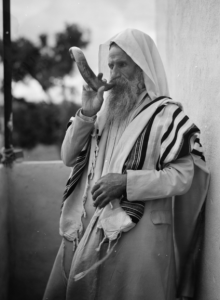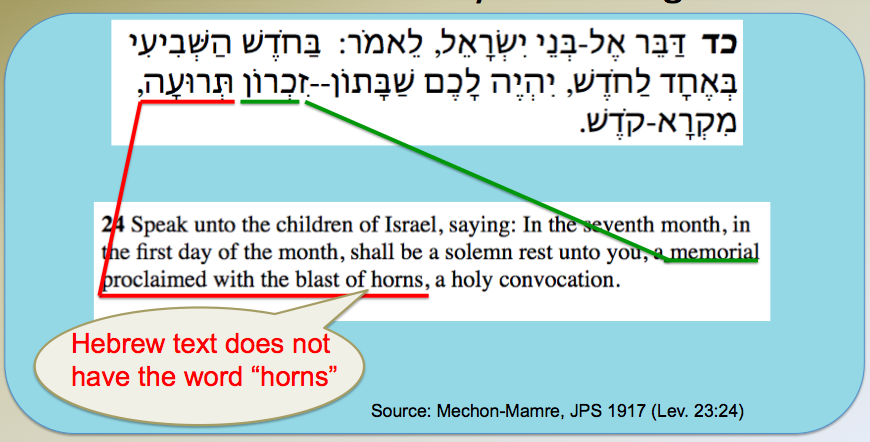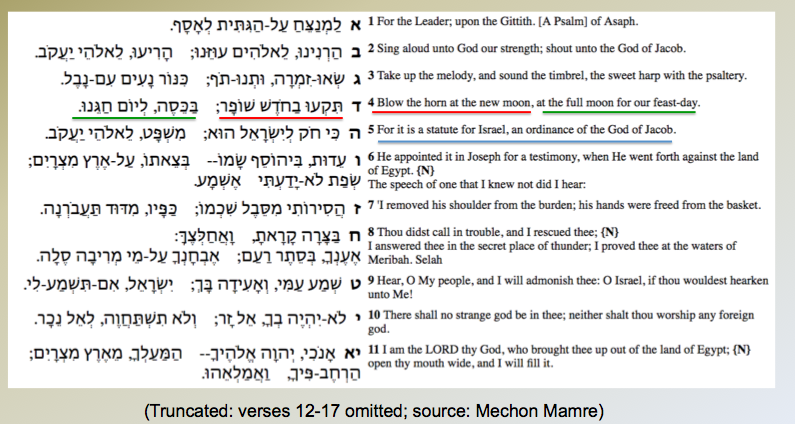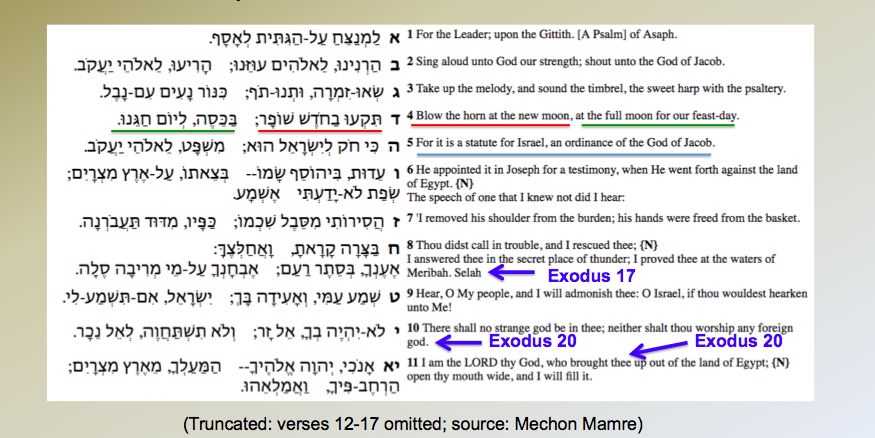
Yemenite Jew blowing the Shofar
I finally did it. For almost 20 years I have been thinking about how to reconcile Psalms 81 which specifically says to blow the Shofar on new moon with the traditional Karaite view that there is no commandment to blow the shofar on the Yom Teruah (i.e., what the Rabbanites call Rosh Ha-shanna), which is a new moon. And this weekend, as I was preparing for a class I taught at a Conservative Synagogue, I did it.
It was actually pretty easy once I read the entirety of Psalms 81 (and not just the part that was perplexing me).
To set up the issue, let’s start with Leviticus 23:24 which says that the first day of the Seventh Month shall be a Zichron Teruah. The word teruah is a loud sound, and may be made by shouting, may be made by silver trumpets or may be made by shofar, among other items. The standard Rabbinic view is that “teruah” as in “Yom Teruah” (the First Day of the Seventh Month) must be made by the shofar. And the standard Karaite view is that teruah is not made by a shofar.
There is significant confusion about this among English readers, because the Jewish Publication Society 1917 (as well as many other Rabbanite translations, as well as Christian translations) translates the verse in question by assuming teruah is made by a shofar (or horn, generally). The screen shot below is from the learning I did on Monday evening regarding the holidays of the Seventh Month.
The JPS supplies the word “horns” to make sense of the verse according to the Rabbanite halakha. Of course, every translation is an interpretation. And there is actually nothing wrong with this translation if you are approaching the text from a Rabbanite perspective, which JPS is doing.
But, let there be no doubt: the JPS translation reflects the Rabbanite interpretation.
If I had wanted to translate this verse according to the Standard Karaite interpretation, I would have translated “zichron teruah” as a “memorial shout” – and Yom Teruah (from Numbers 29) as a “Day of Shouting.”
Okay, now that we have set up the issue, let’s turn to Psalms 81 (which has caused me trouble off and on since 1999).
Below is a screen shot that I included in Monday evening’s learning. [Fn 1.]
As you can see in verse 4, it expressly says to blow (from tekia, not from teruah) the horn (this time, shofar is in the text) at the new moon. The JPS translation also says that the shofar should be blown at the full-moon, which is the feast day. Whether this indeed means “full moon” or the “concealed moon” (i.e., when there was no moon visible in the sky) was a significant debate in the comments here. (And is something I don’t intend to get into now.)
In any event, from a Karaite perspective, the next line (verse 5) seems even more problematic, for it seems to suggest that “blowing the shofar at the new moon . . . ” is a “statute for Israel, an ordinance of the God of Jacob.” Others have also connected Psalms 81:4 with Yom-Teruah/Rosh Ha-shanna (and apparently Rabbanite communities read it on the holiday). [FN 2]
Uh-oh. How can this be? I spent my entire Karaite life explaining that there is no commandment to blow the shofar. I was perplexed. If only there were a Karaite Guide for the Perplexed.
So, here’s what’s going on (in my opinion). This is indeed talking about Rosh Ha-shanna – just not the Rosh Ha-shanna (or Yom Teruah) that is about to be celebrated. It is referring to the Biblical New Year, which occurs in the First Month of the Year, the Month of Aviv, the month in which Hag Ha-matzot occurs – and this is the Hag/feast that is mentioned in verse 4.
Now let me prove it to you.
Let’s start with Verse 5: For it is a statute for Israel, an ordinance of the God of Jacob.
- Note that the verse does not say that there is a “commandment” to blow the shofar. It only says that something is a statute for Israel and ordinance for the God of Jacob. My theory is that this something is Hag Ha-matzot – see Exodus 13. (It is possible that the statute/ordinance refers both the new moon and to the Hag, but I don’t have to get into that for my point.)
Verse 6: He appointed it in Joseph for a testimony, when He went forth against the land of Egypt.
- Hag Ha-matzot is indeed the testimony of what God did when He went forth against Egypt. And in fact, per Exodus 13, we are required to retell this event every year, as if we are testifying that it happened. And that same passage also says that the Exodus will be a sign on our hand and a memorial. Another concept related to testimony. [I note that many Rabbanite interpretations suggest that it was “Joseph who went out and ruled over Egypt” and that it was not “God who went over Egypt.] (Again here too it is possible that the testimony is the new moon/full moon of that month, and not specifically Hag Ha-matzot.)
Verse 7: I removed the shoulder from his burden (sevel).
- This seems to be a direct reflection of Exodus 6:6, in which God tells Moses to tell the Israelites that He will deliver them from the burden (sevel) of Egypt.
Verse 8: . . . I proved thee at the waters of Meribah. Selah.
- This proving at the waters of Meribah occurred in Exodus 17. Recall that the Exodus itself occurred in Chapter 13, so we have progressed from Exodus 13 to Exodus 17. (I acknowledge that the reference to Exodus 17 is much more explicit than the reference to Exodus 13 above.)
Verses 10-11: There shall no strange god be in thee; neither shalt thou worship any foreign god. I am the LORD thy God, who brought thee up out of the land of Egypt . . .
- This is a reference to the 10 Commandments, which is given in Exodus 20, just a few chapters after the testing at Meribah.
Here is a quick summary of the crux of my interpretation of these first 11 verses. (Note: that verses 12-17 also suggest that this is about Giving of the Torah . . . but I don’t need to get into that in order to make my point.)
So there you have it. My theory is that this is not at all talking about the shofar on Yom Teruah, rather it is talking about giving praise (via song, melody, timbrel, shout, and shofar) to God during the recollection of the month of Exodus. The Psalmist is not saying there is a commandment to do this, he is using flowery, poetic language encouraging people to acknowledge this important event.
Finally, I note that the Karaite sage H’ Yefeth ben Eli believed that this verse was apparently read during Shavuot, which shows that at least one other Karaite connected this with the Giving of the Torah. I only learned of his view after I figured it out for myself. If only we could get the works of these great Karaite sages published.
Now, you tell me. How’d I do?
* * *
FN1: I actually removed this from the learning video which I will post, because there was a glitch in the sound.
FN2: BTW, I will check to see whether Psalms 81 appears in the Karaite liturgy for Yom Teruah. It would not surprise me, because the Karaite liturgy tends to find all related themes and weave them together. I could see Psalms 81:4 being woven in because of the connection to the new moon.





I believe that the Karaite position of the observance of Yom Teruah, on the day of this appointed season, as “remembrance shouting” is correct. A parallel verse for this type of shouting can be found in 1 Samuel 4:5 “And when the ark of the covenant of the LORD came into the camp, all Israel shouted with a great shout, so that the earth rang.” [1917 JPS Translation]. However, that does not absolve us from blowing the Shofar during the evening appearance of EVERY new moon. Karaites should not be anti-shofar blowing at the appropriate times: Psalm 150:3 – Praise Him with the blast of the horn ( הַלְלוּהוּ, בְּתֵקַע שׁוֹפָר); praise Him with the psaltery and harp;
The Torah, in the book of Number 10:9-10 states: “Also in the day of your gladness, and in your appointed seasons, and in your new moons, ye shall blow with the trumpets (chatsotsĕrah) over your burnt-offerings, and over the sacrifices of your peace-offerings; and they shall be to you for a memorial before your God: I am the LORD your God.’ ” (Schoken Bible Translation). Granted that Chatsotserah are not shofarot but there is a blowing of a musical instrument to usher in the new moon.
So I am much more comfortable with the fact that the Karaite Sages got it right in not sounding instruments on Yom Teruah, but our sages erred in not insisting that all new moons be ushered in as instructed by Bamidar 10:9. There is no conflict between doing both.
Thank you for this.
It is good to be able to see & function with “both… and…”, rather than “either… or…”
Good functional space for encouraging conversations and building healthy relationships & dialogue. Being “a light to the nations” is impeded less by internal disputes when we can find more space for “both.”
Sorry to spoil the party oh Eli`ezer. The Schoken Bible, Vol. 1 (Five Books of Moshe render B’Midbar 10:10 “And on the day(s) of your rejoicing, your appointed-times, and the heads of your New-moons, you are to blow-a-blast on the trumpets together with your offerings-up and together with your slaughter-offerings of shalom; they shall be of you a reminder, before your God- I am YHWH your God!”.
He does not succumb to the Anglo-American Xtian proclivity to write “the LORD” instead of the four letters of Elohim’s name.
Secondly, “Ḥaṣoṣerah” is the singular form of Ḥaṣoṣerot (plural).
Nonetheless, I agree with you that the Qaraite Ḥakhamim erred in failing to insist that two silver trumpets be manufactured and placed at the disposal of every Qaraite synagogue for the express purpose of blowing them — preferably by kohanim — on every New Moon day, Mo`ed (Appointed Time) and day of rejoicing e.g. Purim, Jerusalem Day and (Israeli) Independence Day.
This omission, in turn, further betrays the dubious nature of the traditional Qaraite view regarding the synagogue as a “Miqdash Me`aṭ” i.e a place which seeks to emulate the Holy Temple.
Silly Zvi, your minor correction does not spoil the party when you agree with the main premise.
Now back to the substance of Shawn’s post that seeks to show that “…It is referring to the Biblical New Year, which occurs in the First Month of the Year, the Month of Aviv, the month in which Hag Ha-matzot occurs – and this is the Hag/feast that is mentioned in verse 4…”
So let me address the 10,000 pound gorilla in the room…”Do the Karaites therefore blow the Shofar during the First day of the Month of Aviv?”
So, if your theory is correct, what should the shouting be about?
Is there a traditional understanding of what to shout?
These are shouts of prayer. But when I post the learning you can watch and see the range of opinions.
Everett Fox renders the term Zikhron Teru`ah as “a reminder by (horn-)blasting”. Unfortunately he went wrong here; evidently he succumbed to his own Rabbinic upbringing or even bias.
Shawn, thank you in advance for planning to post the most valuable Learning 3 Lesson you presented last evening, on this site.
Until he does, here is the highlights of: Teruah and the blowing of the shofar.
In this awesome lesson, Shawn brought his presentation based of Hebrew Tanach sources used to justify that “teruah”, as cited by the actual use of this word in that text, can be categorized into 5 possible verb tense uses of the word in action form. He cited that there is NO Ancient HEBREW version of the text that interpreted Teruah as “HORNS”. This use of the word was due to newer date interpretations of rabbinical origins. He also cited the 10th and 11th Century Hakham origins and their interpretations!(which I have not included here due to space).
Note: ALL sources listed below are attributed from Shawn’s work and his searchings through the Tanach for references. This is merely only a small part of micro-captions taken from my notes during this awesome presentation. Forgive me Shawn if I have mis-typed or transcribed your words incorrectly. I trust you will correct me if I have.
teruah
Shouting-16 examples, Josh6:5 20, 1 Sam 4:5, 6(x2), 2 Sam 6:5, Jer 20:16,
Ezek 21:27, Amos, Job 39:25
Likely Shouting-only once, Amos 2:2
Silver Trumpets-5 times, 2 Chron 13:12, Numbers 10:5, 6(x2), 31:6
Misc- 6 NON-shofar
Shofar- SOLE account is in Lev.25:9, only on JUBILEE year
Likely shofar- 5 times, Numbers 25:21, Jer 4:19, 49:2, Zeph1:16, Psalms 47:5
then, In Psalms 81
He explained that there is a chronology of time in YEARS that these following verses below were covering over history.
& most important is that there is NO ordained commandment that states to blow the shofar on a new moon.
:4 Blow the horn at the new moon, at the full moon for a feast-day (This is only for the REAL 1st month of the year Rosh Hashanah and not the rabbinical calendar new year that is used in modern time)
:5 For it is a statute for Israel, an ordinance of the G-d of Jacob
Note that verse :8 (APPLIES AFTER THE EXODUS 17)
He also discussed the binding of Isaac in regard to Yom Teruah, and again noting when this time period of history occurred, where there was a notation regarding a rams HORN stuck in brush, and that was later rabbinically interpreted wrongly.
Perhaps you may wish to reference all the Tanach citations be brought above, and please, if you know of any others that are not listed, post them here for all of us to read and consider.
shalom.
Hi Shawn
How do you know Tikoo Bachodesh Shofar means the New Moon. Does Rosh Chodes, Rabbinate or Karaite not refer to the New Moon yet the word Rosh, hinting at being at the first be more correct and how do you know even with the omission of “Rosh” its talking New Moon.?
Maybe it means half or quarter moon
And overall, is moon not call Halevanah, in the Torah? Is this word “Bekiseh” for Full Moon not strange as full moon has always had it phrased as Rosh Chodesh
Some of these look like loan words and not actual Hebrew, but some aramaic or loan words for the strange name Bekiseh for HaLevanah. We know in Hebrew Today we say Yareach. I hope Im not asking for too much info but like you, I have question spanning back decades, but you are a young man, wait till you get to your late 50s like me and your one perplexing issue turns into dozens if not more. 🙂
Thank you for anything you may be able to explain.
ilanb
Ilan, the Rabbinic writings are at fault for making many of us think that the moon is called “Halevanah” in the Torah itself.
Wow… this is so in depth but yet so simple to discern the applied factors in really what was and is to be as a guidelines for to establish the coming months…For we all try to follow that the correct settings are by the moon =
the months… from this root word comes from the moon itself…And yes, the beginning of the month is none other than the Aviv…For without the pivotal and of which should be the most important month…
Without the proper settings… the action/s of celebrating on a difference day becomes a questionable factor/s to check more thoroughly within the Torah… Thanks Shawn
This argument strikes me as highly “rabbinic”; it seems an attempt to find a basis for actual practice (or, in the case of the shofar, non-practice) in Biblical texts. I’ve always believed that the Karaite way was the reverse: to determine what practice should be on the basis of the text.
Hi Howard, Excellent Point! In this case, I “took for granted” the overwhelming evidence that the shofar is not being commanded. So, I then had to resolve the last inconsistency, which was this verse. But your point is a good one.
here is the learning: https://www.youtube.com/watch?v=UbWpWziWjOg
Pingback: Why is this Karaite Writing about the Shofar on "Rosh Hashana"? - A Blue Thread
Shalom, today was researching how “UTC” time fits with new moon time and when to blow the shofar. Your site came up. After reading and understanding what I could of everyones notes and know this thread is over 2 yrs old. How does 1 Sam 20:27 fit? Shaul is upset that David has missed the New Moon Feast on the Second day of the party. If this is to be r/t 1st day of 1st month then this story has a specific date, but if it is all new moons, then it does not. Also how long is the new moon feast? I didn’t even think about it as a feast until I thought of this story while reading everyone’s notes, only thought just blow the Shofar or Silver Trumpet.
I was trying to understand how to figure out the new moon for today is 23 Feb 2020 here in New Mexico USA. I was confused was it last night or tonight. Came across UTC and it says the new moon here is at 8:32 this morning. I understand that it is to be done by sight, but it was interesting we now have a way to know when it exactly happens.
Not sure if you know, but Chrome says your site is Not Secure.